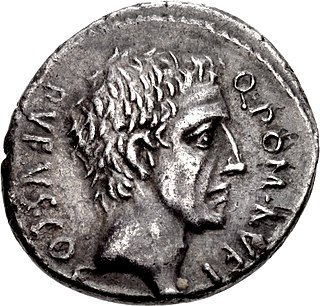Censorship
In 214 BC, Furius was a censor with Marcus Atilius Regulus, but he died at the beginning of the following year, before the solemn purification (lustrum) of the people had been performed; and Regulus accordingly, as was usual in such cases, resigned his office.
These censors visited with severity all persons who had failed in their duty to their country during the great calamities that Rome had lately experienced. They reduced to the condition of aerarians all the young nobles who had planned to leave Italy after the battle of Cannae, among whom was Lucius Caecilius Metellus, who was a quaestor in the year of their censorship. As, however, Metellus was elected tribune of the plebs for the following year notwithstanding his degradation, he attempted to bring the censors to trial before the people, immediately after entering upon his office, but was prevented by the other tribunes from prosecuting such an unprecedented course.
Furius was also one of the augurs at the time of his death. [5] [6] [7]
This article concerns the period 219 BC – 210 BC.

The gens Furia, originally written Fusia, and sometimes found as Fouria on coins, was one of the most ancient and noble patrician houses at Rome. Its members held the highest offices of the state throughout the period of the Roman Republic. The first of the Furii to attain the consulship was Sextus Furius in 488 BC.

The gens Atilia, sometimes written Atillia, was a plebeian family at ancient Rome, which rose to prominence at the beginning of the fourth century BC. The first member of this gens to attain the consulship was Marcus Atilius Regulus, in 335 BC. The Atilii continued to hold the highest offices of the state throughout the history of the Republic, and well into imperial times.

The gens Licinia was a celebrated plebeian family at ancient Rome, which appears from the earliest days of the Republic until imperial times, and which eventually obtained the imperial dignity. The first of the gens to obtain the consulship was Gaius Licinius Calvus Stolo, who, as tribune of the plebs from 376 to 367 BC, prevented the election of any of the annual magistrates, until the patricians acquiesced to the passage of the lex Licinia Sextia, or Licinian Rogations. This law, named for Licinius and his colleague, Lucius Sextius, opened the consulship for the first time to the plebeians. Licinius himself was subsequently elected consul in 364 and 361 BC, and from this time, the Licinii became one of the most illustrious gentes in the Republic.
Agrarian laws were laws among the Romans regulating the division of the public lands, or ager publicus. In its broader definition, it can also refer to the agricultural laws relating to peasants and husbandmen, or to the general farming class of people of any society.

The gens Aquillia or Aquilia was a plebeian family of great antiquity at ancient Rome. Two of the Aquillii are mentioned among the Roman nobles who conspired to bring back the Tarquins, and a member of the house, Gaius Aquillius Tuscus, was consul in 487 BC.
Marcus Atilius Regulus was a Roman politician and statesman. He was consul in 227 and 217 BC and later censor in 214 BC. He was the son of his homonymous father who was consul in 267 and 256 BC.
Lucius Caecilius Metellus Denter was consul in 284 BC, and praetor the year after. In this capacity, he fell in the war against the Senones and was succeeded by Manius Curius Dentatus.

The gens Sempronia was one of the most ancient and noble houses of ancient Rome. Although the oldest branch of this gens was patrician, with Aulus Sempronius Atratinus obtaining the consulship in 497 BC, the thirteenth year of the Republic, but from the time of the Samnite Wars onward, most if not all of the Sempronii appearing in history were plebeians. Although the Sempronii were illustrious under the Republic, few of them attained any importance or notice in imperial times.
Marcus Caecilius Metellus was a Roman politician who served as plebeian aedile in 208 BC and as praetor urbanus in 206 BC. He was the son of Lucius Caecilius Metellus and the brother of Quintus Caecilius Metellus and Lucius Caecilius Metellus. While serving as plebeian aedile alongside Gaius Servilius Geminus, he oversaw the repetition of the Plebeian Games for two days, donated three statues to the Temple of Ceres, and held banquet for Jupiter during the festivities. He was elected praetor in 206 BC, the same year that his brother, Quintus, was consul, and given jurisdiction over the city. In 205 BC, he served as an ambassador to Attalus I, the king of Pergamon.
The gens Aebutia was an ancient Roman family that was prominent during the early Republic. The gens was originally patrician, but also had plebeian branches. The first member to obtain the consulship was Titus Aebutius Helva, consul in 499 BC.

The gens Caecilia was a plebeian family at ancient Rome. Members of this gens are mentioned in history as early as the fifth century BC, but the first of the Caecilii who obtained the consulship was Lucius Caecilius Metellus Denter, in 284 BC. The Caecilii Metelli were one of the most powerful families of the late Republic, from the decades before the First Punic War down to the time of Augustus.
The gens Servilia was a patrician family at ancient Rome. The gens was celebrated during the early ages of the Republic, and the names of few gentes appear more frequently at this period in the consular Fasti. It continued to produce men of influence in the state down to the latest times of the Republic, and even in the imperial period. The first member of the gens who obtained the consulship was Publius Servilius Priscus Structus in 495 BC, and the last of the name who appears in the consular Fasti is Quintus Servilius Silanus, in AD 189, thus occupying a prominent position in the Roman state for nearly seven hundred years.

The gens Canuleia was a minor plebeian family at ancient Rome. Although members of this gens are known throughout the period of the Republic, and were of senatorial rank, none of them ever obtained the consulship. However, the Canuleii furnished the Republic with several tribunes of the plebs.
The gens Verginia or Virginia was a prominent family at ancient Rome, which from an early period was divided into patrician and plebeian branches. The gens was of great antiquity. It frequently filled the highest honors of the state during the early years of the Republic. The first of the family who obtained the consulship was Opiter Verginius Tricostus in 502 BC, the seventh year of the Republic. The plebeian members of the family were also numbered amongst the early tribunes of the people.

Quintus Pompeius Rufus was a consul of the Roman Republic in 88 BC. His colleague in office was the future dictator Sulla.
The gens Laetoria was a plebeian family at ancient Rome. Its members appear regularly throughout the history of the Republic. None of the Laetorii ever obtained the consulship, but several achieved lesser offices of the Roman state.
The gens Maenia, occasionally written Mainia, was a plebeian family at ancient Rome. Members of this gens are first mentioned soon after the establishment of the Republic, and occur in history down to the second century BC. Several of them held the position of tribune of the plebs, from which they strenuously advocated on behalf of their order. The most illustrious of the family was Gaius Maenius, consul in 338 BC, and dictator in both 320 and 314. In some manuscripts, the nomen Maenius appears to have been erroneously substituted for Menenius or Manlius; there are also instances of confusion with Manilius, Maelius, and Maevius.
The gens Manilia was a plebeian family at ancient Rome. Members of this gens are frequently confused with the Manlii, Mallii, and Mamilii. Several of the Manilii were distinguished in the service of the Republic, with Manius Manilius obtaining the consulship in 149 BC; but the family itself remained small and relatively unimportant.
The gens Metilia was a minor family at ancient Rome. Although they occur throughout Roman history, and several were tribunes of the plebs, beginning in the fifth century BC, none of the Metilii attained the higher offices of the Roman state until imperial times, when several of them became consul.
![]() This article incorporates text from a publication now in the public domain : Smith, William, ed. (1870). "Philus (1)". Dictionary of Greek and Roman Biography and Mythology . Vol. 3. p. 335.
This article incorporates text from a publication now in the public domain : Smith, William, ed. (1870). "Philus (1)". Dictionary of Greek and Roman Biography and Mythology . Vol. 3. p. 335.






